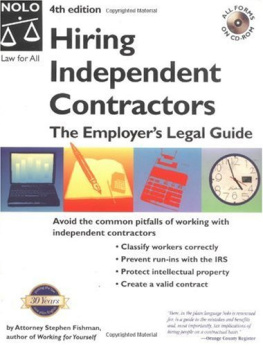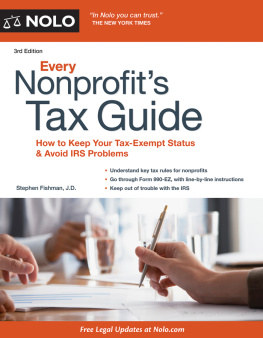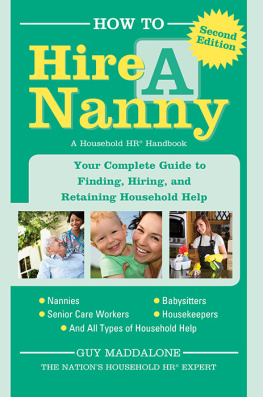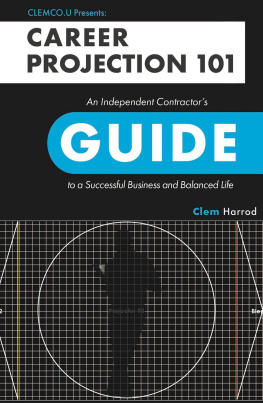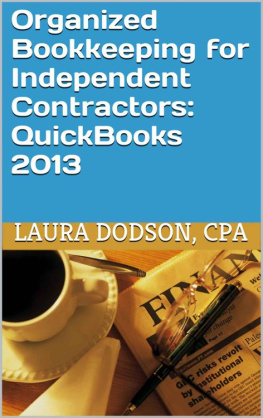Hiring Independent ContractorsThe Employers Legal Guide, 4th edition
by attorney Stephen Fishman
Edited by attorney Amy DelPo
Fourth Edition | MAY 2003 |
Editor | AMY DELPO |
Cover Design | TONI IHARA |
Illustrations | MARI STEIN |
Book Design | TERRI HEARSH
STEPHANIE HAROLDE |
Proofreading | ROBERT WELLS |
CD-ROM Preparation | JENYA CHERNOFF & ANDR ZIVKOVICH |
Index | JANET PERLMAN |
Printing | ARVATO SERVICES, INC. |
Fishman, Stephen.
Hiring independent contractors : the employers legal guide / by Stephen Fishman. 4th ed.
p. cm.
Includes index.
ISBN 0-87337-918-7
1. Independent contractorsLegal status, laws, etc.United StatesPopular works. 2. Witholding taxLaw and legislationUnited StatesPopular works. I. Title.
KF898.F57 2003
346.73024dc21
2003041281
Copyright 1996, 1997, 2000 and 2003 by Stephen Fishman. ALL RIGHTS RESERVED. Printed in the USA.
No part of this publication may be reproduced, stored in a retrieval system, or transmitted in any form or by any means, electronic, mechanical, photocopying, recording or otherwise without the prior written permission of the publisher and the authors. Reproduction prohibitions do not apply to the forms contained in this product when reproduced for personal use.
For information on bulk purchases or corporate premium sales, please contact the Special Sales Department. For academic sales or textbook adoptions, ask for Academic Sales. Call 800-955-4775 or write to Nolo, 950 Parker Street, Berkeley, CA 94710.
Acknowledgments
Many thanks to:
Barbara Kate Repa and Amy DelPo for their superb editing.
Jake Warner for his editorial contributions.
Fred Daily for many helpful comments on federal tax law.
Terri Hearsh for the outstanding book design and Margaret Livingston for her good-natured and meticulous production work.
Jenya Chernoff and Andr Zivkovich for CD-ROM preparation.
Janet Perlman for the helpful index.
Bob Wells for thorough proofreading.
About the Author
Stephen Fishman received his law degree from the University of Southern California in 1979. After stints in government and private practice, he became a full-time legal writer in 1983. He has helped write and edit over a dozen reference books for attorneys. Among the books he has written for Nolo are Working for Yourself: Law & Taxes for Independent Contractors, Freelancers & Consultants.
Read This First
The information in this book is as up to date and accurate as we can make it. But its important to realize that the law changes frequently, as do fees, forms and procedures. If you handle your own legal matters, its up to you to be sure that all information you useincluding the information in this bookis accurate. Here are some suggestions to help you:
First, make sure youve got the most recent edition of this book. To learn whether a later edition is available, check the edition number on the books spine and then go to Nolos online Law Store at www.nolo.com or call Nolos Customer Service Department at 800-728-3555.
Next, even if you have a current edition, you need to be sure its fully up to date. The law can change overnight. At www.nolo.com, we post notices of major legal and practical changes that affect the latest edition of a book. To check for updates, find your book in the Law Store on Nolos website (you can use the A to Z Product List and click the books title). If you see an Updates link on the left side of the page, click it. If you dont see a link, that means we havent posted any updates. (But check back regularly.)
Finally, we believe accurate and current legal information should help you solve many of your own legal problems on a cost-efficient basis. But this text is not a substitute for personalized advice from a knowledgeable lawyer. If you want the help of a trained professional, consult an attorney licensed to practice in your state.
Chapter 1: Why You Need This Book
Overview
This is a book about the legal ins and outs of hiring and working with independent contractors (ICs)people who contract to work for others without having the legal status of an employee.
You need this book if you work with or plan to work with independent contractors. This book serves as a complete legal guide to safely hiring and using independent contractors. It explains how to determine whether a worker should be classified as an independent contractor or employee, how to document your classification decision and how to reduce the chances of being subject to or losing an IRS or other government audit.
This book is for business owners, top management and personnel managers. But they are not the only ones who need to know how to hire and deal with independent contractors. For a worker to qualify as an IC, he or she must be treated like one. Business managers at all levels must understand how to treat independent contractors, or risk inadvertently converting them into employees. Other workers who come into daily contact with independent contractors should have a basic understanding of the issues involved as well.
While not specifically written for independent contractors, many of them will find much of the information in this book useful, too.
A. What Are Independent Contractors?
An independent contractor is a person who contracts to perform services for others, but who does not have the legal status of an employee. Most people who qualify as independent contractors follow their own trade, business or professionthat is, they are in business for themselves. This is why they are called independent contractors. They earn their livelihoods from their own independent businesses instead of depending upon an employer to earn a living.
Good examples of ICs are professionals with their own practicesfor example, doctors, lawyers, dentists and accountants. You may have many choice names for your dentist, but employee is probably not one of them. If your dentist has his or her own practice, he or she is an independent businessperson offering dental services to the public, not your employee.
However, a worker doesnt have to be a highly educated professional to be an IC. The person you hire to paint your office or mow your lawn can also be a businessperson and qualify as an IC.
B. Why Hire Independent Contractors?
There are numerous reasons why you might choose to hire an independent contractor for a job. These are discussed in more detail in . Often the biggest reason that a company wants to classify a worker as an independent contractor rather than as an employee, however, is that independent contractors tend to be less expensive than employees. To use an independent contractor, companies simply need to pay whatever the IC charges them for the job. With employees, however, there are a number of additional costs. Employers must withhold federal and state income taxes from their employees paychecks, and they must pay to the government fees and taxes for Social Security, Medicare, unemployment insurance and workers compensation insurance. In addition, an employer might choose to provide certain benefits to employees, such as health insurance, stock options, retirement benefits, paid sick leave and paid vacation time.
ICs also offer flexibility. A company can hire them for specific, limited tasks and gain their specialized expertise, without the cost and obligations associated with full-time employees. ICs allow companies to expand or contract the workforce quickly and cheaply, without the headaches and costs of layoffs or firings.

